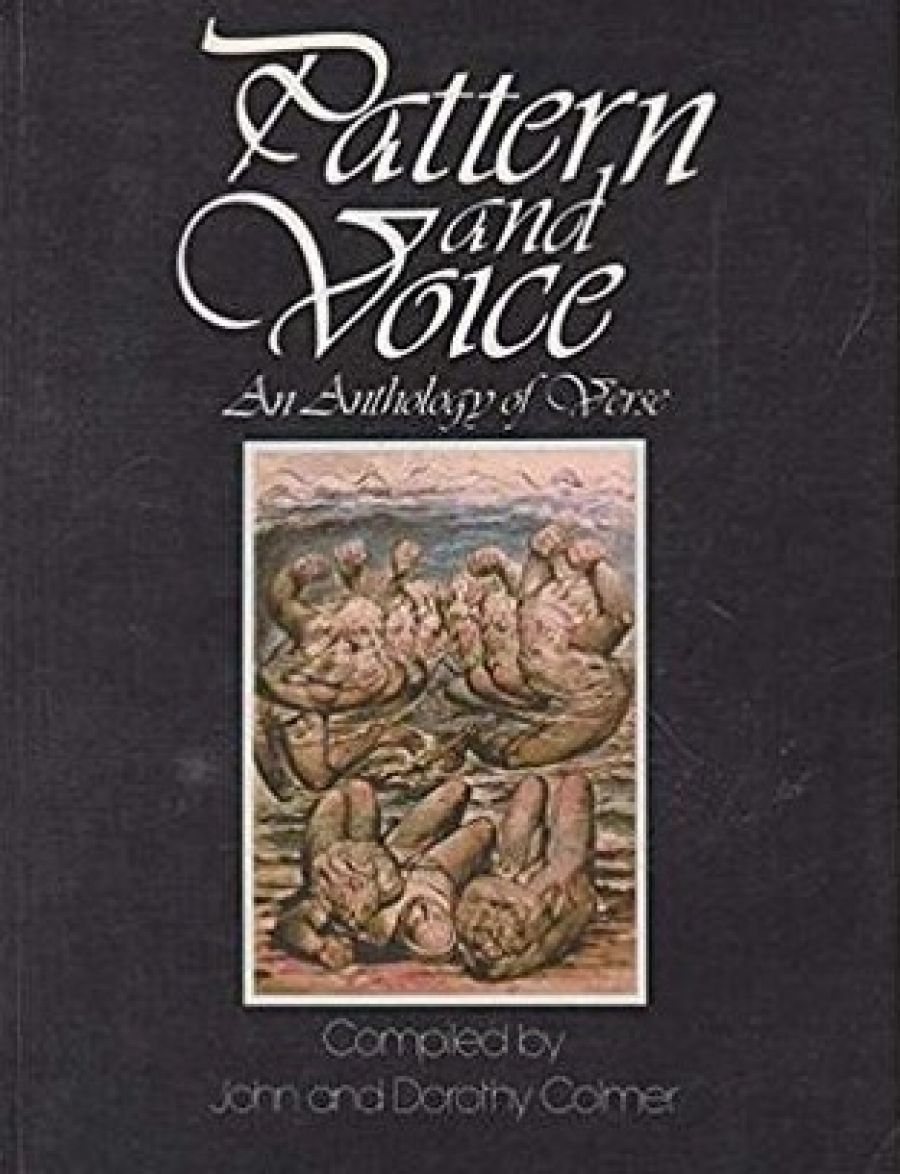
- Free Article: No
- Contents Category: Australian Poetry
- Review Article: Yes
- Article Title: Poets With A Capital P
- Online Only: No
- Custom Highlight Text:
John and Dorothy Colmer have produced Pattern and Voice (Macmillan, $10.95 pb, 234 pp), an anthology of verse which will be of interest to all teachers and students of poetry. It has a blend of classic and contemporary poetry and includes many Australian poets.
- Book 1 Title: Pattern and Voice
- Book 1 Biblio: Macmillan, $10.95 pb, 234 pp
Sir Patrick Spens gets a mention in the ‘Ballads’ section, which makes it one of the most often used anthology chestnuts. Apart from more poems by Anon, there are balads by Harry Morant and Banjo Paterson.
In the ‘Enjoyment of Words’ section there is the delightful poem ‘Dahn the Plug-’ole’ and of course ‘Jabberwocky’. Australian poets don’t feature very often in this section, but overall our poets predominate.
The commentary at the beginning of each section is sometimes informative but often dull. To know that sonnets come ‘in all shapes and sizes’ is probably not necessary. The collection is made with students and teachers as the expected market, but the preface and section commentaries are dry and urbane. Many of the points will be useful to the readers, but the language is not likely to levitate a classroom.
Australian schools looking for a new anthology to replace Poet’s Choice and other old favourites will find this book difficult to beat, as it combines all the poets you must read (Shakespeare, Coleridge, Wordsworth, Byron, Shelley, and Hardy) with a wide selection of Australians.
Les Murray, Shapcott, Wright, Malouf, Dawe, and Wallace-Crabbe all feature in this book, and it is interesting to note that Michael Dransfield is now among the anthologised poets.
Bearings by John Kelly
Polding Press, $5.95 pb, 89 pp
John Kelly’s new book of poetry, Bearings (Polding Press, $5.95 pb, 89 pp), has been published by Polding Press and distributed by the Central Catholic Library Bookshop.
Most of the poetry is of a religious nature and might appeal to the fervently faithful, but for casual agnostics it holds little charm. Some of the verse has a gentle warmth, but if you haven’t made the Church your cloister, then most of it will not inspire you to read on.
The poem ‘Ward 14’ is dedicated to Sylvia Plath and is one of the better poems. The unworldliness of the poet becomes an annoyance in the poem ‘Impressions of Parkville 3052’ where he refers to the ‘swishing noise of lorries’. I thought we had trucks in Australia.
All in all, I prefer G.M. Hopkins.
 Scarpdancer by Alan Alexander
Scarpdancer by Alan Alexander
Freemantle Arts Centre Press, $5.50 pb, 57 pp
Alan Alexander’s Scarpdancer (Freemantle Arts Centre Press, $5.50 pb, 57 pp) is another of the beautifully produced books from the Freemantle Arts Centre Press.
Alexander was born in Ireland and remembers his grandmother reading poetry to him. The poet’s own verse has a strong lyricism, perhaps influenced by the musical language of his childhood memories. His responses to the natural features of the Australian landscape are keen and soothe the mind with the ease of their flow.
Alexander also brings the glass into focus upon the marital state and the small actions are enlarged, made significant, where in the run of life they may be lost. He takes a view of humans as dancers on the knife edge of the scarp. The teetering attempts of us to balance our lives, to survive equilibrium.
The book is well edited, sensitively illustrated, and the poems complement each other. The occasional poem rankles, especially those that bestow upon poets a greater divinity than the common man.
From the bud sprung from the seedling
That those in Art go forth to sow.
That, to me, seems pretentious. To give art a capital A is to give the poet a capital P as if it were a separate species.


Comments powered by CComment